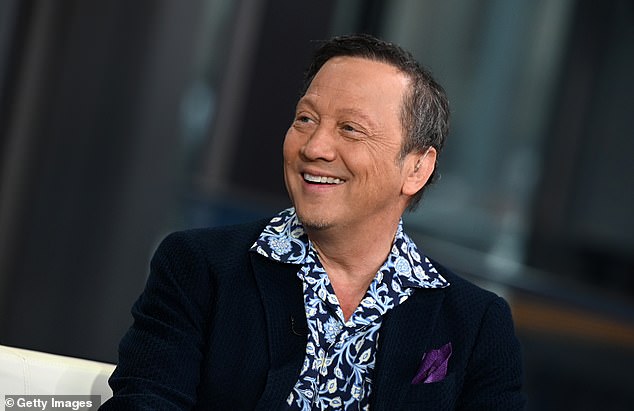Actor-comedian Rob Schneider has launched a bizarre attack on Dr Anthony Fauci over vaccine safety.
The Saturday Night Live star, 61, dared Dr Anthony Fauci to take all 72 approved childhood vaccines at once to prove they are safe.
While speaking about chronic diseases on a talk show this week, Schneider said the childhood vaccine schedule has ‘ramped up’ since he was a kid, suggesting the shots are not necessary.
He also falsely claimed there has ‘never been a study of the entire vaccine schedule’ recommended by the CDC for children from birth to age 18.
The Saturday Night Live star, who has long shared anti-vaccine opinions, called out Dr Fauci and former CDC director Dr Rochelle Walensky and asked them both to take all of the vaccines in the schedule.
He said: ‘I’d like to see you show up and get the whole [schedule] if you think it’s so safe.
‘Get the whole recommended childhood schedule and do it right there on stage, do all the 52 doses right now, and see how safe it is.
‘They’ll never do it.’

Rob Schneider, pictured here, dared Dr Anthony Fauci to take all of the shots in the childhood vaccine schedule to prove they are safe
While largely influencing the research and rollout of the Covid vaccines, Dr Fauci has never played a role in setting the childhood vaccine schedule.
Schneider didn’t single out any particular shot, though in the past he has voiced concerns over Covid vaccines and schools giving shots for human papillomavirus (HPV), a sexually transmitted infection responsible for nine in 10 cases of cervical cancer.
He also retweeted a post in 2019 that claimed ‘fake news media’ wouldn’t tell the truth about Andrew Wakefield, the disgraced British researcher who falsely claimed the measles, mumps and rubella (MMR) vaccine causes autism.
Schneider said on an episode of The Sage Steele Show this week: ‘They just ramped up the schedule from three shots when I was a kid. Now we have 52 different doses.’
According to Children’s Hospital of Philadelphia, four vaccines were recommended during the 1960s, when Schneider was a child: DTaP (diphtheria, tetanus and pertussis), MMR, polio and smallpox.
There are multiple brands of approved vaccines in the US, adding up to 782 in total, though children are not given all of these.
In total, children are recommended to get 15 shots for different diseases in the CDC’s childhood vaccine schedule.
Some of these are given in multiple doses, meaning a child receives up to about 35 to 40 doses by the time they turn 18.
This doesn’t include a yearly flu vaccine or Covid boosters.
The only vaccines required to attend public schools in most states are DTaP, MMR, polio and varicella.

Schneider, who has long held anti-vaccine beliefs, said: ‘They just ramped up the schedule from three shots when I was a kid. Now we have 52 different doses’

While largely influencing the research and rollout of the Covid vaccines, Dr Fauci (pictured here) has never played a role in setting the childhood vaccine schedule
The meningitis vaccine is typically required for college students.
The rest, for diseases like influenza and varicella (chickenpox), are recommended by most states but not mandatory.
Schneider also claimed there are no studies evaluating the safety of the full childhood vaccine schedule. However, several recent scientific reviews done this.
In 2013, the Institute of Medicine looked at all shots on the schedule and found no links between adverse effects like anaphylaxis and immunizations.
And in 2021, the Agency for Healthcare Research and Quality (AHRD), an arm of the CDC, reviewed 57,000 citations and 189 studies on the vaccine schedule and found no evidence of an increased risk of severe side effects.
However, it also noted there ‘remains insufficient evidence to make conclusions about some rare potential adverse events.’
Several vaccines have also been shown to be effective with a low risk of complications. The MMR vaccine, for example, is 97 percent effective at preventing measles, mumps and rubella.
The CDC estimates anaphylaxis has only occurred in one of every 1million doses, and seizures have been tied to just one in 4,000 doses.



